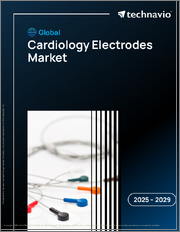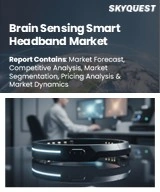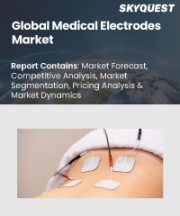
|
시장보고서
상품코드
1707347
전기경련요법 시장 : 제품 유형별, 용도별, 최종사용자별, 지역별Global Electroconvulsive Therapy Market, By Product Type, By Application, By End User, By Geography |
||||||
전 세계 전기경련요법 시장 규모는 2025년에 1,790만 달러로 추정되며 2032년에는 2,180만 달러에 달할 것으로 예상되며 2025년부터 2032년까지 2.9%의 연평균 성장률(CAGR)로 성장할 것으로 예상됩니다.
| 보고서 범위 | 보고서 상세 | ||
|---|---|---|---|
| 기준 연도 | 2024년 | 2025년 시장 규모 | 1,790만 달러 |
| 실적 데이터 | 2020-2024년 | 예측 기간 | 2025-2032년 |
| 예측 기간 : 2025-2032년 CAGR: | 2.90% | 2032년 가치 예측 | 2,180만 달러 |
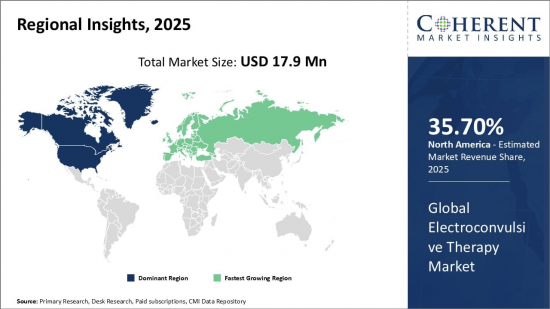
전기경련요법(ECT)은 다른 치료법에 반응하지 않는 중증 우울증이나 양극성 장애 환자에게 가장 많이 사용되는 치료법입니다. 환자에게 마취한 상태에서 뇌에 짧은 시간 동안 전기 자극을 가합니다. 초기 사용에는 오명이 있었지만, ECT는 크게 발전하여 특정 정신 질환에 대한 안전하고 효과적인 치료법으로 여겨지고 있으며, 1930년대에 처음 도입된 이래로 기술적으로나 안전 측면에서 많은 개선이 이루어졌습니다. 현대 진료에서 환자는 시술 전에 근육 이완제를 투여하고 전신 마취를 합니다. 두피의 특정 부위에 전극을 부착하고 제어된 전류를 뇌에 흐르게 하여 짧은 시간 동안 발작을 일으킵니다. ECT의 작용 기전은 아직 완전히 밝혀지지 않았지만, 특정 정신 질환의 증상을 빠르게 회복시키는 뇌 화학적 변화를 일으키는 것으로 생각됩니다. 치료를 합니다. 단기적인 부작용으로는 단기 기억상실, 방향감각 상실, 착란 등이 있을 수 있지만, 대개 일시적일 뿐이며, ECT는 특히 자살 위험이 높은 중증 우울증 환자나 약물 치료를 견디지 못하거나 반응하지 않는 환자에게는 생명을 구할 수 있는 치료법이 될 수 있습니다. 치료 옵션으로서 ECT는 신중하게 고려되어야 하며, 환자와 가족, 치료팀 간에 위험과 이익에 대한 충분한 논의가 필요하며, ECT는 환자의 안전과 동의를 보장하기 위해 엄격한 의료 지침에 따라 시행되고 있습니다.
시장 역학:
치료 저항성 우울증과 같은 정신 질환의 유병률 증가는 세계 전기경련요법 시장의 성장을 촉진하는 주요 요인입니다. 예를 들어, 세계보건기구(WHO)에 따르면 2020년 전 세계적으로 2억 6,400만 명 이상이 우울증을 앓고 있으며, 매년 약 85만 명이 우울증으로 사망하고 있습니다. 양측 단시간 펄스 자극을 통한 기술적으로 진보한 ECT 장비의 도입이 보급을 더욱 촉진하고 있습니다.
그러나 ECT에 따른 두통, 메스꺼움, 착란, 기억상실 등의 부작용이 큰 걸림돌로 작용하고 있습니다. 표적화 경두개 자기자극의 개발은 새로운 기회입니다.
본 조사의 주요 특징
- 세계의 전기경련요법 시장을 상세히 분석하여 2024년을 기준 연도로 하여 예측 기간(2025-2032년)의 시장 규모와 연평균 성장률(CAGR)을 조사하여 전해드립니다.
- 또한, 다양한 부문에 걸친 잠재적 수익 기회를 밝히고, 이 시장의 매력적인 투자 제안 매트릭스를 설명합니다.
- 또한 시장 촉진요인, 억제요인, 기회, 신제품 출시 및 승인, 시장 동향, 지역별 전망, 주요 기업의 경쟁 전략 등에 대한 주요 인사이트를 제공합니다.
- 회사 하이라이트, 제품 포트폴리오, 주요 하이라이트, 재무 성과, 전략 등의 매개 변수를 기반으로 세계 전기경련요법의 주요 기업을 프로파일링합니다.
- 이 보고서의 인사이트를 통해 마케팅 담당자와 기업 경영진은 향후 제품 출시, 유형화, 시장 확대, 마케팅 전략에 대한 정보에 입각한 의사결정을 내릴 수 있습니다.
- 세계 전기경련요법 시장 보고서는 투자자, 공급업체, 제품 제조업체, 유통업체, 신규 진입자, 재무 분석가 등 이 업계의 다양한 이해관계자를 대상으로 합니다.
- 이해관계자들은 세계 전기경련요법 시장 분석에 사용되는 다양한 전략 매트릭스를 통해 의사결정을 쉽게 내릴 수 있습니다.
목차
제1장 조사 목적과 가정
- 조사 목적
- 가정
- 약어
제2장 시장 전망
- 보고서 설명
- 시장 정의와 범위
- 주요 요약
- Coherent Opportunity Map(COM)
제3장 시장 역학, 규제, 동향 분석
- 시장 역학
- 주요 하이라이트
- 규제 시나리오
- 최근 동향
- PEST 분석
- PORTER의 분석
- 합병, 인수 및 제휴
제4장 세계의 전기경련요법 시장 - COVID-19 팬데믹의 영향
- COVID-19 역학
- 공급측과 수요측 분석
- 경제에 대한 영향
제5장 세계의 전기경련요법 시장, 제품 유형별, 2020-2032년
- 편측 전기경련요법
- 양측 전기경련요법
제6장 세계의 전기경련요법 시장, 용도별, 2020-2032년
- 주요우울장애(MDD)
- 양극성 장애
- 정신분열증
- 기타
제7장 세계의 전기경련요법 시장, 최종사용자별, 2020-2032년
- 병원과 진료소
- 외래 수술 센터
- 기타
제8장 세계의 전기경련요법 시장, 지역별, 2020-2032년
- 북미
- 유럽
- 아시아태평양
- 라틴아메리카
- 중동
- 아프리카
제9장 경쟁 구도
- 기업 개요
- Mecta
- Ectron
- Somatics, LLC.
- Jude Medical(Abbott)
제10장 섹션
- 참고문헌
- 조사 방법
- 출판사 소개
Global Electroconvulsive Therapy Market is estimated to be valued at USD 17.9 Mn in 2025 and is expected to reach USD 21.8 Mn by 2032, growing at a compound annual growth rate (CAGR) of 2.9% from 2025 to 2032.
| Report Coverage | Report Details | ||
|---|---|---|---|
| Base Year: | 2024 | Market Size in 2025: | USD 17.9 Mn |
| Historical Data for: | 2020 To 2024 | Forecast Period: | 2025 To 2032 |
| Forecast Period 2025 to 2032 CAGR: | 2.90% | 2032 Value Projection: | USD 21.8 Mn |

Electroconvulsive Therapy (ECT) is a medical treatment most commonly used for patients with severe major depression or bipolar disorder that has not responded to other treatments. It involves a brief electrical stimulation of the brain while the patient is under anesthesia. Despite the stigma associated with its early use, ECT has significantly evolved and is considered a safe and effective intervention for certain psychiatric disorders. It was first introduced in 1930s, and has undergone numerous modifications in terms of both technique and safety. In modern practice, patients are given a muscle relaxant and put under general anesthesia before the procedure. Electrodes are placed at specific sites on the scalp, and a controlled electric current is passed through the brain, which causes a brief seizure. The mechanisms by which ECT works are still not fully understood, but it is believed to cause changes in brain chemistry that can quickly reverse symptoms of certain mental health conditions. ECT is typically administered two to three times a week, for a total of six to twelve treatments. The immediate side effects may include short-term memory loss, disorientation, and confusion, but these are usually transient. ECT can be life-saving, particularly for individuals with severe depression who are at high risk of suicide, or for those who cannot tolerate or do not respond to medication. As a treatment option, ECT must be considered with caution, and thorough discussions between the patient, their family, and the treatment team are necessary to address the risks and benefits. ECT is practiced under stringent medical guidelines to ensure patient safety and consent.
Market Dynamics:
Rising prevalence of mental health disorders such as treatment-resistant depression is a key driver augmenting the growth of global electroconvulsive therapy market. For instance, according to the World Health Organization (WHO), in 2020, more than 264 Mn people worldwide suffered from depression, and approximately 850,000 deaths are depression-related each year. Introduction of technologically advanced ECT devices with bilateral brief-pulse stimulus is further fueling the adoption.
However, side effects that are associated with ECT includes headache, nausea, confusion, and memory loss act as a major restraint. Development of targeted transcranial magnetic stimulation is an emerging opportunity.
Key features of the study:
- This report provides in-depth analysis of the global electroconvulsive therapy market, and provides market size (US$ Mn) and compound annual growth rate (CAGR %) for the forecast period (2025-2032), considering 2024 as the base year
- It elucidates potential revenue opportunities across different segments and explains attractive investment proposition matrices for this market
- This study also provides key insights about market drivers, restraints, opportunities, new product launches or approval, market trends, regional outlook, and competitive strategies adopted by key players
- It profiles key players in the global electroconvulsive therapy market based on the following parameters - company highlights, products portfolio, key highlights, financial performance, and strategies
- Key companies covered as a part of this study include Mecta, Ectron, Somatics, LLC., St.Jude Medical (Abbott), and among others
- Insights from this report would allow marketers and the management authorities of the companies to make informed decisions regarding their future product launches, type up-gradation, market expansion, and marketing tactics
- Global electroconvulsive therapy market report caters to various stakeholders in this industry including investors, suppliers, product manufacturers, distributors, new entrants, and financial analysts
- Stakeholders would have ease in decision-making through various strategy matrices used in analyzing the global electroconvulsive therapy market
Detailed Segmentation:
- Global Electroconvulsive Therapy Market, By Product Type
- Unilateral Electroconvulsive Therapy
- Bilateral Electroconvulsive Therapy
- Global Electroconvulsive Therapy Market, By Application
- Major Depressive Disorder (MDD)
- Bipolar Disorder
- Schizophrenia
- Others
- Global Electroconvulsive Therapy Market, By End User
- Hospitals & Clinics
- Ambulatory Surgical Centers
- Others
- Global Electroconvulsive Therapy Market, By Region
- North America
- Europe
- Asia Pacific
- Latin America
- Middle East
- Africa
- Company Profiles
- Mecta
- Ectron
- Somatics, LLC.
- Jude Medical (Abbott)
- Among Others
Table of Contents
1. Research Objectives and Assumptions
- Research Objectives
- Assumptions
- Abbreviations
2. Market Purview
- Report Description
- Market Definition and Scope
- Executive Summary
- Global Electroconvulsive Therapy Market, By Product Type
- Global Electroconvulsive Therapy Market, By Application
- Global Electroconvulsive Therapy Market, By End User
- Global Electroconvulsive Therapy Market, By Region
- Coherent Opportunity Map (COM)
3. Market Dynamics, Regulations, and Trends Analysis
- Market Dynamics
- Increasing prevalence of mental disorders
- Risk of cognitive impairment
- Advances in ECT devices
- Key Highlights
- Regulatory Scenario
- Recent Trends
- PEST Analysis
- PORTER's Analysis
- Mergers, Acquisitions, and Collaborations
4. Global Electroconvulsive Therapy Market- Impact of Coronavirus (COVID-19) Pandemic
- COVID-19 Epidemiology
- Supply Side and Demand Side Analysis
- Economic Impact
5. Global Electroconvulsive Therapy Market, By Product Type, 2020-2032, (US$ Mn)
- Introduction
- Market Share Analysis, 2025 and 2032 (%)
- Y-o-Y Growth Analysis, 2021 - 2032
- Segment Trends
- Unilateral Electroconvulsive Therapy
- Introduction
- Market Size and Forecast, and Y-o-Y Growth, 2020-2032,(US$ Mn)
- Bilateral Electroconvulsive Therapy
- Introduction
- Market Size and Forecast, and Y-o-Y Growth, 2020-2032,(US$ Mn)
6. Global Electroconvulsive Therapy Market, By Application, 2020-2032, (US$ Mn)
- Introduction
- Market Share Analysis, 2025 and 2032 (%)
- Y-o-Y Growth Analysis, 2021 - 2032
- Segment Trends
- Major Depressive Disorder (MDD)
- Introduction
- Market Size and Forecast, and Y-o-Y Growth, 2020-2032,(US$ Mn)
- Bipolar Disorder
- Introduction
- Market Size and Forecast, and Y-o-Y Growth, 2020-2032,(US$ Mn)
- Schizophrenia
- Introduction
- Market Size and Forecast, and Y-o-Y Growth, 2020-2032,(US$ Mn)
- Others
- Introduction
- Market Size and Forecast, and Y-o-Y Growth, 2020-2032,(US$ Mn)
7. Global Electroconvulsive Therapy Market, By End User, 2020-2032, (US$ Mn)
- Introduction
- Market Share Analysis, 2025 and 2032 (%)
- Y-o-Y Growth Analysis, 2021 - 2032
- Segment Trends
- Hospitals & Clinics
- Introduction
- Market Size and Forecast, and Y-o-Y Growth, 2020-2032,(US$ Mn)
- Ambulatory Surgical Centers
- Introduction
- Market Size and Forecast, and Y-o-Y Growth, 2020-2032,(US$ Mn)
- Others
- Introduction
- Market Size and Forecast, and Y-o-Y Growth, 2020-2032,(US$ Mn)
8. Global Electroconvulsive Therapy Market, By Region, 2020-2032, (US$ Mn)
- Introduction
- Market Share Analysis, By Region, 2025 and 2032 (%)
- Y-o-Y Growth Analysis, For Region, 2021 -2032
- Country Trends
- North America
- Introduction
- Market Size and Forecast, and Y-o-Y Growth, By Product Type, 2020-2032,(US$ Mn)
- Market Size and Forecast, and Y-o-Y Growth, By Application, 2020-2032,(US$ Mn)
- Market Size and Forecast, and Y-o-Y Growth, By End User, 2020-2032,(US$ Mn)
- Market Size and Forecast, and Y-o-Y Growth, By Country, 2020-2032,(US$ Mn)
- U.S.
- Canada
- Europe
- Introduction
- Market Size and Forecast, and Y-o-Y Growth, By Product Type, 2020-2032,(US$ Mn)
- Market Size and Forecast, and Y-o-Y Growth, By Application, 2020-2032,(US$ Mn)
- Market Size and Forecast, and Y-o-Y Growth, By End User, 2020-2032,(US$ Mn)
- Market Size and Forecast, and Y-o-Y Growth, By Country, 2020-2032,(US$ Mn)
- Germany
- U.K.
- Spain
- France
- Italy
- Russia
- Rest of Europe
- Asia Pacific
- Introduction
- Market Size and Forecast, and Y-o-Y Growth, By Product Type, 2020-2032,(US$ Mn)
- Market Size and Forecast, and Y-o-Y Growth, By Application, 2020-2032,(US$ Mn)
- Market Size and Forecast, and Y-o-Y Growth, By End User, 2020-2032,(US$ Mn)
- Market Size and Forecast, and Y-o-Y Growth, By Country, 2020-2032,(US$ Mn)
- China
- India
- Japan
- Australia
- South Korea
- ASEAN
- Rest of Asia Pacific
- Latin America
- Introduction
- Market Size and Forecast, and Y-o-Y Growth, By Product Type, 2020-2032,(US$ Mn)
- Market Size and Forecast, and Y-o-Y Growth, By Application, 2020-2032,(US$ Mn)
- Market Size and Forecast, and Y-o-Y Growth, By End User, 2020-2032,(US$ Mn)
- Market Size and Forecast, and Y-o-Y Growth, By Country, 2020-2032,(US$ Mn)
- Brazil
- Argentina
- Mexico
- Rest of Latin America
- Middle East
- Introduction
- Market Size and Forecast, and Y-o-Y Growth, By Product Type, 2020-2032,(US$ Mn)
- Market Size and Forecast, and Y-o-Y Growth, By Application, 2020-2032,(US$ Mn)
- Market Size and Forecast, and Y-o-Y Growth, By End User, 2020-2032,(US$ Mn)
- Market Size and Forecast, and Y-o-Y Growth, By Country, 2020-2032,(US$ Mn)
- GCC Countries
- Israel
- Rest of Middle East
- Africa
- Introduction
- Market Size and Forecast, and Y-o-Y Growth, By Product Type, 2020-2032,(US$ Mn)
- Market Size and Forecast, and Y-o-Y Growth, By Application, 2020-2032,(US$ Mn)
- Market Size and Forecast, and Y-o-Y Growth, By End User, 2020-2032,(US$ Mn)
- Market Size and Forecast, and Y-o-Y Growth, By Country/Region, 2020-2032,(US$ Mn)
- North Africa
- Central Africa
- South Africa
9. Competitive Landscape
- Company Profile
- Mecta
- Company Highlights
- Product Portfolio
- Key Highlights
- Financial Performance
- Strategies
- Ectron
- Company Highlights
- Product Portfolio
- Key Highlights
- Financial Performance
- Strategies
- Somatics, LLC.
- Company Highlights
- Product Portfolio
- Key Highlights
- Financial Performance
- Strategies
- Jude Medical (Abbott)
- Company Highlights
- Product Portfolio
- Key Highlights
- Financial Performance
- Strategies
- Analyst Views
10. Section
- References
- Research Methodology
- About us






